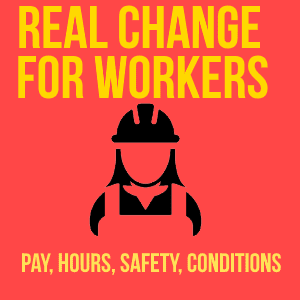Following the Financial Times‘ revelation that the Tories are planning further attacks on workers’ rights through stripping away the EU’s Working Time Directive, SSP Workplace Organiser Richie Venton has called for urgent mobilisation.
As the Tories plot to impose sweatshop conditions on workers, the SSP reiterates its call for a strengthening of workers’ rights and job conditions, for fighting Trade Unions, and for a four-day week on five-day’s pay.

By SSP Workplace Organiser Richie Venton
The Tories are hatching plans to assault basic rights at work, hot on the heels of Brexit.
Reports of their steps to dismantle limited protections for workers under the EU’s Working Time Directive are tucked away in the Financial Times, not a publication the average worker reads on the bus or train to work!
Leaderships of the trade union movement urgently need to get up on their hind legs, alert workers to the looming danger, and mobilise a movement to defeat these Tory attacks.
The Westminster government’s Business Department (BEIS) are drawing up the plans, with the full approval of Boris Johnson, and in consultation with at least some representatives of big business.

The Blue Brexiteers were delighted when Boris Johnson earlier this month held court with 250 business leaders, where he sought their support for further deregulation of the labour market, post-Brexit.
Working Time Directive
The specific measures they are hatching include dismantling of the 48-hour cap on the working week; what they’ve called ‘tweaking’ regulations on rest breaks during shifts, under the same EU Working Time Directive; and to remove overtime pay from calculations of holiday pay.
The Blue Brexiteers conned many working-class people to vote for Brexit with the false Dominic Cummings slogan “Take Back Control”, and Johnson has sung lullabies about “levelling up” in Brexit Britain.
As we warned, their real agenda is to ‘take back control’ for the employers without them being fettered in their exploitation of workers by any minor restrictions – won by workers’ struggles and codified in EU Directives.
Capitalist EU not a Workers’ Nirvana!
There are many regressive laws and Directives emanating from the capitalist EU, such as obstacles to nationalisation, the Posted Workers Directive that helps bosses use cheap, nil-rights labour, and the imperative to privatise, wholesale.

There are many other workplace rights which have absolutely nothing to do with the EU and in fact predate its very existence, contrary to the gushing nonsense about the EU being some kind of workers’ Nirvana, spouted by the likes of the SNP, Scottish Greens and indeed many union leaders.
For example, the right to paid holidays was won by French workers during the 1936 factory sit-down strikes, and equal pay legislation was won by repeated strikes by women workers in Fords Dagenham in 1968.
Dented Shields Against UK Assaults
However, some EU Directives and European Court of Justice rulings did afford at least a very dented shield of protection for workers from the worst excesses of British capitalist rule, under the governments of Maggie Thatcher, Tony Blair and more recent Tory regimes.
Prime examples of such are the very measures the Tories now want to dilute or dismantle, as they map out the route to making Brexit Britain the Singapore of Europe, with minimum rights, minimum taxation of big business, and maximum profiteering.
Under the Working Time Directive, a cap of 48 hours on the working week can only be exceeded if a worker waives his or her right to this limit, signing paperwork agreeing to work over 48 hours when asked to.
48-Hour Cap – Sort of!
In theory, no employer can compel a worker to put in more than 48 hours, but of course in many cases – in the absence of a strong, organised Union – workers have been subjected to not very subtle pressure, and bullying, to sign the waiver.
Furthermore, as a reminder of just how limited the EU is as a dented shield against bosses who want to endlessly lengthen the working week, as a member state of the EU, Britain and other countries opted out of this Directive.
That’s what led to the junior doctors’ strikes, as they were not covered by this ruling and were subjected to horrendously long hours, at risk both to their own health and that of patients.

Other workers such as security guards have the 48-hour Directive applied in such an incredibly complex fashion that working 60-plus hours is entirely typical for most weeks.
Breaks During Shifts
The Working Time Directive has acted as at least some restraint on the horror stories of workers doing long shifts without a break.
As the Tories plan – as they coyly express it – to ‘tweak’ these regulations on rest breaks, we should prepare for employers running rampant, bullying workers into non-stop production without adequate rest, in their relentless pursuit of every extra penny in profit.
And of course, even with the Working Time Directive on break times, there is absolutely no guarantee of them being paid breaks. They almost never are except where the strength of a union in the workplace forces employers to concede at least some paid breaks.
Holiday Average Pay
The Tory government plans to remove overtime pay from calculations of holiday pay would particularly hit hard the lowest paid; the vast battalions of part-timers who rely on additional hours to eke out a living.
As we’ve often said, casualisation is the curse of the modern working class.
Well over a million people are on zero hours contracts, and their numbers actually increased during the 2020 pandemic.
Millions more rely on short-term contracts; involuntary part-time work, in most cases. This particularly bedevils major sectors like retail, hospitality and higher education.
A few years ago, a European Court of Justice ruling on part-time workers’ holiday pay forced employers to include overtime, night shift allowances, and other additional payments when calculating how much a worker is paid during their holidays.
This system, often referred to as ‘holiday average’, is a big improvement for many hard-pressed, low-paid workers, who in the past were only paid the equivalent of their contract hours whilst on holiday, rather than the average actual worked hours and average pay received over the previous 13 weeks. And it also enhances the holiday pay of full-timers, including in its calculations the likes of nightshift premium payments and allowances for extra responsibilities or skills.
I well remember bombarding my employer, as the Union convenor, with demands for retrospective payment of the holiday average to the workforce, using this ruling to help force them to concede, against their extreme reluctance. Several unions went to court to enforce this ECJ ruling, to the benefit of countless low-paid workers.
If the Tories get away with dismantling this right it will be yet another turning of the screw on workers who can least afford to lose money.
Sweatshop of the Western World
Perhaps the two most frightening reactions to revelations of the Tory plans to use Brexit as a golden opportunity to bludgeon workers with even more intense exploitation, came from the government itself and a spokesperson for the TUC.
A government spokesperson made the incredible assertion “The UK has one of the best workers’ rights records in the world”!
In fact, it’s almost universally recognised that Britain has the most repressive anti-trade union, anti-worker legislation in the entire Western world.
In response a TUC spokesperson muttered the Tory plans are “a concern”!
Build Resistance
Instead of such a pathetic, spineless reaction, national trade union leaders need to urgently alert members to the threat, rally them in opposition, produce material for every workplace explaining what is a stake, and thereby mobilise workers to take action to halt the Tories in their tracks.
And it can be done. The same Tory regime, for all their outward appearance of strength and 80-seat majority, have already been forced into more than 20 U-turns within just 12-months of being in office.
In Scotland, the STUC and its affiliated unions should lead the charge, demanding that the Scottish government declare unequivocal opposition to all these aggressive attacks on workers’ conditions, with public instructions that employers and the public sector refuse to implement them, accompanied by demands for employment legislation to be devolved, even prior to winning Scottish independence.
Forward to 4-Day Week on 5 Days’ Pay
In defending what little rights workers have, we should also seize the opportunity to demand radically improved rights at work.
There is something rotten in the state of British capitalism when we have to prepare a battle to defend a maximum 48-hour week in 2021, when 102 years ago the mass strikes of workers in Belfast and Clydeside won a 47-hour week with no loss of earnings.
It’s a criminal indictment of capitalism that over a century after the 1919 strikes, 295,000 Scottish workers are chained to their workplaces more than 49 hours a week – and 54,000 work over 60 hours a week!
With the growth of mass under-employment and the threat of mass unemployment, exacerbated by the pandemic – plus the exponential growth of new technologies – the time is rotten ripe to demand a 4-day week on 5 days’ pay, and similar shortening of the working day.
History has shown we cannot rely on legislation alone to achieve such progress. Indeed, it is usually determined collective action by working people which forces any subsequent progressive legislation on the politicians.
The trade union movement is already committed on paper to a shorter working week without loss of pay, and the call for a 4-day week is galloping forward in its public popularity.
Regardless of how people voted in the Brexit referendum, they urgently need to be united in action to beat back the Tory butchery of workers’ rights, accompanied by a serious campaign for a 4-day week on 5 days’ pay. To combat drudgery, stress, underemployment and unemployment – sharing out the work and liberating workers to have the time to enjoy life and help to democratically organise the workplaces and communities they live in.





